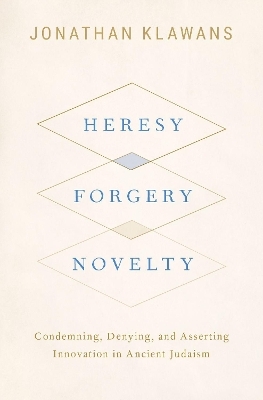
Heresy, Forgery, Novelty
Condemning, Denying, and Asserting Innovation in Ancient Judaism
Seiten
2019
Oxford University Press Inc (Verlag)
978-0-19-006250-7 (ISBN)
Oxford University Press Inc (Verlag)
978-0-19-006250-7 (ISBN)
It is commonly asserted that heresy is a Christian invention that emerged in late antiquity as Christianity distinguished itself from Judaism. Heresy, Forgery, Novelty clearly defines these three important terms in the study of ancient Judaism and early Christianity, and demonstrates that Christianity's heresiological impulse is in fact indebted to Jewish precedents.
It is commonly asserted that heresy is a Christian invention that emerged in late antiquity as Christianity distinguished itself from Judaism. Heresy, Forgery, Novelty probes ancient Jewish disputes regarding religious innovation and argues that Christianity's heresiological impulse is in fact indebted to Jewish precedents.
In this book, Jonathan Klawans demonstrates that ancient Jewish literature displays a profound unease regarding religious innovation. The historian Josephus condemned religious innovation outright, and later rabbis valorize the antiquity of their traditions. The Dead Sea sectarians spoke occasionally-and perhaps secretly-of a "new covenant," but more frequently masked newer ideas in rhetorics of renewal or recovery. Other ancient Jews engaged in pseudepigraphy-the false attribution of recent works to prophets of old. The flourishing of such religious forgeries further underscores the dangers associated with religious innovation.
As Christianity emerged, the discourse surrounding religious novelty shifted dramatically. On the one hand, Christians came to believe that Jesus had inaugurated a "new covenant," replacing what came prior. On the other hand, Christian writers followed their Jewish predecessors in condemning heretics as dangerous innovators, and concealing new works in pseudepigraphic garb. In its open, unabashed embrace of new things, Christianity parts from Judaism. Christianity's heresiological condemnation of novelty, however, displays continuity with prior Jewish traditions. Heresy, Forgery, Novelty reconsiders and offers a new interpretation of the dynamics of the split between Judaism and Christianity.
It is commonly asserted that heresy is a Christian invention that emerged in late antiquity as Christianity distinguished itself from Judaism. Heresy, Forgery, Novelty probes ancient Jewish disputes regarding religious innovation and argues that Christianity's heresiological impulse is in fact indebted to Jewish precedents.
In this book, Jonathan Klawans demonstrates that ancient Jewish literature displays a profound unease regarding religious innovation. The historian Josephus condemned religious innovation outright, and later rabbis valorize the antiquity of their traditions. The Dead Sea sectarians spoke occasionally-and perhaps secretly-of a "new covenant," but more frequently masked newer ideas in rhetorics of renewal or recovery. Other ancient Jews engaged in pseudepigraphy-the false attribution of recent works to prophets of old. The flourishing of such religious forgeries further underscores the dangers associated with religious innovation.
As Christianity emerged, the discourse surrounding religious novelty shifted dramatically. On the one hand, Christians came to believe that Jesus had inaugurated a "new covenant," replacing what came prior. On the other hand, Christian writers followed their Jewish predecessors in condemning heretics as dangerous innovators, and concealing new works in pseudepigraphic garb. In its open, unabashed embrace of new things, Christianity parts from Judaism. Christianity's heresiological condemnation of novelty, however, displays continuity with prior Jewish traditions. Heresy, Forgery, Novelty reconsiders and offers a new interpretation of the dynamics of the split between Judaism and Christianity.
Jonathan Klawans is Professor of Religion at Boston University. He is the author of Impurity and Sin in Ancient Judaism (OUP 2000), Purity, Sacrifice, and the Temple (OUP 2005), and Josephus and the Theologies of Ancient Judaism (OUP 2012). He is also co-editor of the forthcoming Jewish Annotated Apocrypha.
| Erscheinungsdatum | 28.09.2019 |
|---|---|
| Verlagsort | New York |
| Sprache | englisch |
| Maße | 241 x 163 mm |
| Gewicht | 499 g |
| Themenwelt | Geschichte ► Teilgebiete der Geschichte ► Religionsgeschichte |
| Religion / Theologie ► Christentum ► Kirchengeschichte | |
| Geisteswissenschaften ► Religion / Theologie ► Judentum | |
| ISBN-10 | 0-19-006250-9 / 0190062509 |
| ISBN-13 | 978-0-19-006250-7 / 9780190062507 |
| Zustand | Neuware |
| Informationen gemäß Produktsicherheitsverordnung (GPSR) | |
| Haben Sie eine Frage zum Produkt? |
Mehr entdecken
aus dem Bereich
aus dem Bereich
Von den Anfängen bis zur Gegenwart
Buch | Hardcover (2022)
C.H.Beck (Verlag)
CHF 47,60
Herkunft, Blüte, Weg nach Osten
Buch | Hardcover (2024)
C.H.Beck (Verlag)
CHF 55,90


